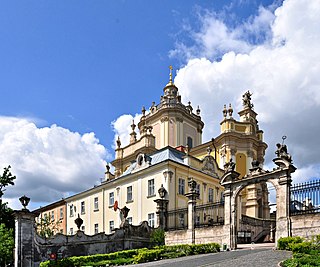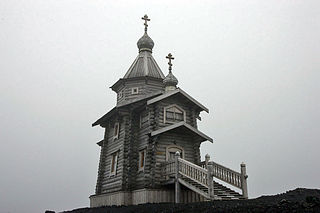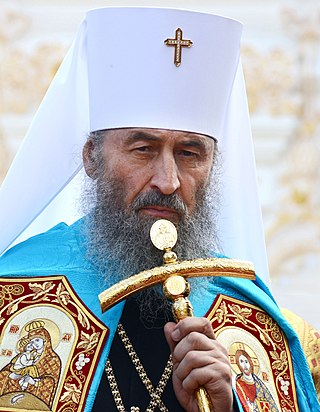
The Russian Orthodox Church, alternatively legally known as the Moscow Patriarchate, is an autocephalous Eastern Orthodox Christian church. It has 194 dioceses inside Russia. The primate of the ROC is the Patriarch of Moscow and all Rus'.

The Orthodox Church in America (OCA) is an Eastern Orthodox Christian church based in North America. The OCA consists of more than 700 parishes, missions, communities, monasteries and institutions in the United States, Canada and Mexico. In 2011, it had an estimated 84,900 members in the United States.

The history of Christianity in Ukraine dates back to the earliest centuries of the history of Christianity, to the Apostolic Age, with mission trips along the Black Sea and a legend of Andrew the Apostle even ascending the hills of Kiev. The first Christian community on territory of modern Ukraine is documented as early as the 9th century with the establishment of the Metropolitanate of Gothia, which was centered in the Crimean peninsula. However, on territory of the Old Rus in Kiev, Christianity became the dominant religion since its official acceptance in 989 by Vladimir the Great, who brought it from Byzantine Crimea and installed it as the state religion of medieval Kievan Rus (Ruthenia), with the metropolitan see in Kiev.

The Ukrainian Autocephalous Orthodox Church was one of the three major Eastern Orthodox churches in Ukraine. The Ukrainian Autocephalous Orthodox Church began in 1917 during the dissolution of the Russian Empire as part of the Ukrainian independence movement and in order to restore the Ukrainian Orthodox Church that existed in the Polish-Lithuanian Commonwealth in 1620–1685 and was annexed by the Moscow Patriarchate without approval of the Ecumenical Patriarchate of Constantinople.

The Ukrainian Greek Catholic Church (UGCC) is a major archiepiscopal sui iuris ("autonomous") Eastern Catholic church that is based in Ukraine. As a particular church of the Catholic Church, it is in full communion with the Holy See. It is the second-largest particular church in the Catholic Church after the Latin Church. The major archbishop presides over the entire Church but is not distinguished with the patriarchal title. The incumbent Major Archbishop is Sviatoslav Shevchuk.

Rusyns, also known as Carpatho-Rusyns, Ruthenians, or Rusnaks, are an East Slavic ethnic group from the Eastern Carpathians in Central Europe. They speak Rusyn, an East Slavic language variety, treated variously as either a distinct language or a dialect of the Ukrainian language. As traditional adherents of Eastern Christianity, the majority of Rusyns are Eastern Catholics, though a minority of Rusyns practice Eastern Orthodoxy. Rusyns primarily self-identify as a distinct Slavic people and they are recognized as such in Croatia, Hungary, Poland, Romania, Serbia, and Slovakia, where they have official minority status. Alternatively, some identify more closely with their country of residence, while others are a branch of the Ukrainian people.

Religion in the Union of Soviet Socialist Republics (USSR) was dominated by the fact that it became the first state to have as one objective of its official ideology the elimination of existing religion, and the prevention of future implanting of religious belief, with the goal of establishing state atheism (gosateizm). However, the main religions of pre-revolutionary Russia persisted throughout the entire Soviet period and religion was never officially outlawed. Christians belonged to various denominations: Orthodox, Catholic, Baptist and various other Protestant denominations. The majority of the Muslims in the Soviet Union were Sunni, with the notable exception of Azerbaijan, which was majority Shia. Judaism also had many followers. Other religions, practiced by a small number of believers, included Buddhism and Shamanism.

The Russian Orthodox Church Outside of Russia, also called Russian Orthodox Church Outside Russia or ROCOR, or Russian Orthodox Church Abroad (ROCA), is a semi-autonomous part of the Russian Orthodox Church. Currently, the position of First-Hierarch of the ROCOR is occupied by Metropolitan Nicholas (Olhovsky).

The Ukrainian Orthodox Church (UOC), commonly referred to by the exonym Ukrainian Orthodox Church of the Moscow Patriarchate (UOC-MP), is an Eastern Orthodox church in Ukraine.

The Russian Orthodox Church is traditionally said to have been founded by Andrew the Apostle, who is thought to have visited Scythia and Greek colonies along the northern coast of the Black Sea. According to one of the legends, St. Andrew reached the future location of Kiev and foretold the foundation of a great Christian city. The spot where he reportedly erected a cross is now marked by St. Andrew's Cathedral.

The Estonian Orthodox Church of the Moscow Patriarchate is a semi-autonomous church in the canonical jurisdiction of the Patriarchate of Moscow whose primate is appointed by the Holy Synod of the latter.

Protestants in Russia constitute 1–2% of the overall population of the country. Additionally there are around 15.000–20.000 Doukhobors and 40.000 Molokans in Russia, who have similarities to Protestantism. By 2004, there were 4,435 registered Protestant societies representing 21% of all registered religious organizations, which is second place after Eastern Orthodoxy. By contrast in 1992 the Protestants reportedly had 510 organizations in Russia.

Jovan Vraniškovski, Metropolitan Jovan of Kruševo and Demir Hisar, of the Macedonian Orthodox Church, formerly known as Jovan VI, Metropolitan of Skopje and the Archbishop of Ohrid, is the former head of the Orthodox Ohrid Archbishopric (2005–2023).

Christianity in the 21st century is characterized by the pursuit of church unity and the continued resistance to persecution and secularization.

Metropolitan Onufriy is the primate of the Ukrainian Orthodox Church (UOC). He is styled "His Beatitude, Onufriy, Metropolitan of Kyiv and All Ukraine".

The Joint Declaration of Pope Francis and Patriarch Kirill, also known as the Havana Declaration, was issued following the first meeting in February 2016 between Pope Francis, who, as the Bishop of Rome, is the pontiff of the Catholic Church, and Patriarch Kirill of Moscow, Patriarch of Moscow and all Rus', Patriarch of the Russian Orthodox Church (ROC), the largest of the Eastern Orthodox churches. This was the first time leaders of the Catholic Church and the Moscow Patriarchate had met. While the meeting was also seen as a symbolic moment in the history of relations between the Catholic Church and the Orthodox churches as a community, which had split in the Great Schism of 1054, centuries before the Moscow Patriarchate was constituted, it was not expected to lead to any immediate rapprochement between them.

The "Russian world" is a concept and a political doctrine usually defined as the sphere of military, political and cultural influence of Russia. This concept is sometimes also phrased as Pax Russica, in parallel to the Pax Romana, and as counterweight to Pax Americana and Pax Britannica before that.
On 15 October 2018, the Russian Orthodox Church broke the communion with the Ecumenical Patriarchate because of a dispute concerning the canonical jurisdiction over Ukraine. This led to the 2018 Moscow–Constantinople schism. Numerous Orthodox churches took position concerning the dispute over the canonical jurisdiction over Ukraine, whether before or after this schism.
The role of religion in the 2022 Russian invasion of Ukraine, along with the impact the invasion has had on religion, have attracted significant attention. Peter Mandaville of the United States Institute of Peace has stated that "the conflict in Ukraine is not only a matter of horrible violence, but also a conflict with deeply rooted religious significance."
The Patriarchal Exarchate of Africa is the exarchate of the Russian Orthodox Church in Africa. It was formed by the decision of the Holy Synod of the Russian Orthodox Church on December 29, 2021. The primate of the exarchate bears the title "of Klin".

















